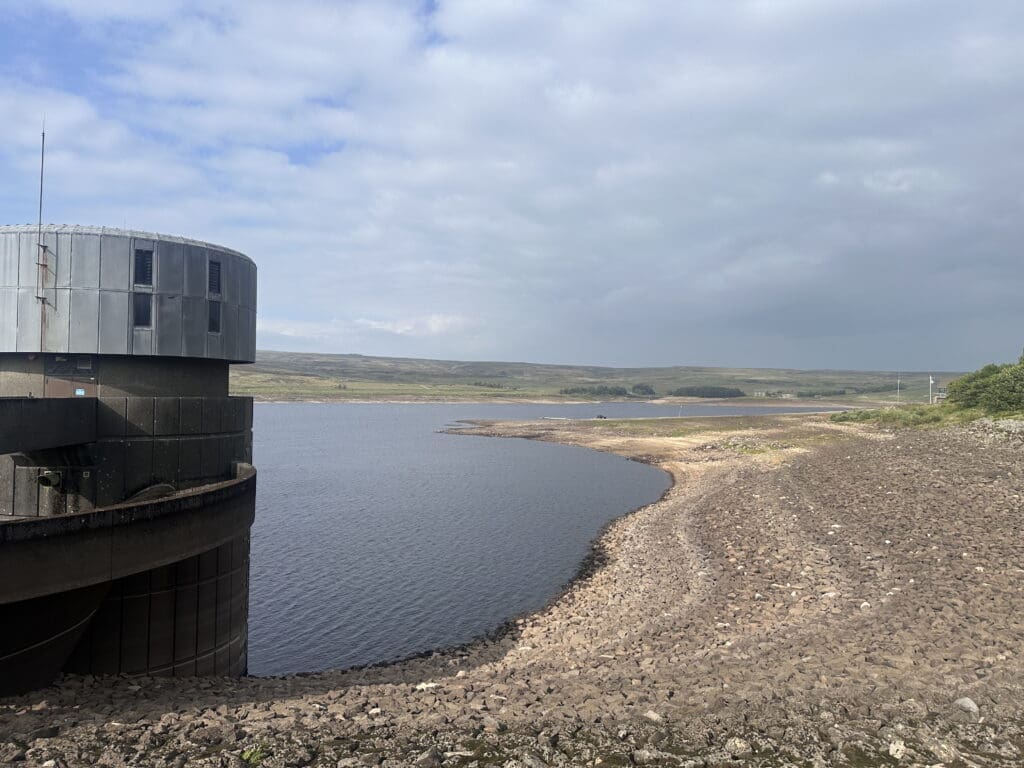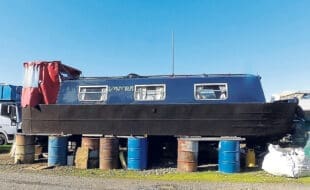Towpath Talk editor Lucy Wood reports…
WATERWAYS businesses are expressing growing concerns as low water levels and stoppages are set to continue into the autumn following what was officially declared the hottest summer on record, leading to calls for an urgent rethink on water management in the UK.
As predictions are made that the country’s reservoirs may not fully recover until at least December and possibly the spring, with swathes of the country’s ageing canal network closed, those whose livelihoods depend on the water say this could be ‘devastating’ in the longer term.

ABNB Boat Brokerage said: “The closure of Watford and Foxton locks on the Grand Union Canal effectively cut off canal access to our brokerage at North Kilworth Marina. This decision has had a direct impact on our business.
“The number of boats offered to us for sale has significantly declined, while buyers are being deterred as they cannot move boats off the Leicester Line by water. Many are instead having to consider the additional cost of road transport, which often results in reduced offers, to the detriment of vendors.
“The impact extends beyond our base. We also have boats at outlying locations which are sitting idle awaiting surveys, but progress has been hampered by low water levels. In some cases, although we can get the boat to a survey location, there is not enough water to get over the cill to dock, or to be floated onto a trolly for lift out.
“Without significant rainfall, I fear for the remainder of the year – not only for us, but for allinland waterways business that are being affected throughout the network. We are hearing rumours that the locks will not be opened until winter, which will be devastating.”
Crick Wharf Marina told Towpath Talk: “The drought-related closures have had a serious impact. With Watford and Foxton locks on the Grand Union Canal, Leicester line, closed since July 29, moorers have been unable to return to their home mooring at Crick, and our winter moorers have been unable to navigate to us, leaving berths unexpectedly empty. This has resulted in the complete loss of our winter bookings, which form a vital part of our annual income.
“As operators, the uncertainty around water levels led us to install stop planks to manage the reduced supply and to protect the infrastructure of the marina. While necessary, these measures highlight the seriousness of the situation.
“The lack of rainfall and continued closures across the network are creating a growing concern for the months ahead, both for our marina and for the wider waterways community.”
Coalboat Alton, a 1936 Big Woolwich working boat, delivers solid fuels, diesel and other supplies on the Peak Forest, Macclesfield, Trent and Mersey and Shropshire Union canals. “It’s been a tough summer for us coalboaters, with closures and a lack of water, but we’re carrying on as much as we possibly can, so please, as we move towards autumn, any support and custom you can offer is appreciated,” they wrote on social media, describing how water had dropped by a foot in places.
Tooley’s Boatyard, on the Oxford Canal, in Banbury, which first opened in 1778, said it may be forced to shut after losing 80% of its business. Its managing director, Matthew Armitage, told the BBC he was “very, very concerned about the future of the company” because of the “lack of work.”
These unprecedented environmental conditions were confirmed at the beginning of September by The Met Office, which reported that summer 2025 was officially the UK’s hottest on record, following the driest spring in more than 50 years.
Liveaboard boaters have either become stranded or face a dash to another location, while popular tourist routes have reportedly seen boating holidays cancelled – as the Canal & River Trust, as reported, faces a shortfall in the funding it needs to keep the network open.
Towpath Talk reader Jan Pickles Price said: “We are stuck at Foxton below the locks. We can still move, but we are sitting on the bottom of the canal. A few weeks ago, we were stuck in Stone, Staffordshire – quite literally grounded in the middle of the canal. After some gentle coaxing, we made it to a sort-of mooring, three feet off the designated moorings and on the tilt. The following week we made it to the Caldon Canal, but we grounded several times. They shut the canal for one day to try to allow levels to recover in time for expected boats for that weekend. Three boats passed us.
“Finally, we made it to the end of the Leek Branch. Our return trip was just as bad, grounding in Bridgeholes. A short time after, they closed that canal completely.
“In my opinion, it’s been left too late to save water. We boaters are very worried about the future of the bit of canal we are on, and that of others.”
And reader T Phoenix told us: “We bought a narrowboat to cruise through the six months March to October. As it happens, our boat is now a two-year project and not going far. It took three months to get her down to Gloucester due to the storms and three months later we can’t take boat beyond Gloucester. This weather episode is a warning to our communities that we need this situation to be a national emergency topic.
“The impact on businesses, jobs and the economies that the canal system supports is huge. We should harness the power of the sea, invest in dams and reservoirs, and educate landowners to help control flooding/drought issues.
“The problems facing the canal network should become a focus for a change in the way we look at power and energy. There isn’t time for consultations and planning red tape – this is a national emergency.”
Water levels are so low that the remains of two coal barges are now visible near Plank Lane Bridge on the Leeds & Liverpool Canal and the wreck of an old Mini next to the piped aqueduct at Ladybower Reservoir, Derbyshire, has been exposed. In Sheffield, a bridge that was inundated when Broomfield Reservoir was built in the 1920s has reemerged for the first time.
Yorkshire Water announced its reservoirs are at 32.6% capacity, compared to a 73% average for this time of year; a hosepipe ban remains in place in the county.
While rainfall has returned to most of the UK, nature organisations say it won’t fix the consequences of the drought, warning that these first downpours can bring dangerous ‘first flushes’ of pollutants into our waterways – from litter and fertiliser to untreated sewage.
The Rivers Trust said: “To secure future water supplies, we must urgently rethink how we view and manage water. The UK can no longer rely on the assumption that it is a consistently wet country with an endless supply of rain.”




